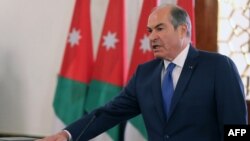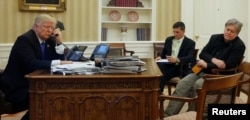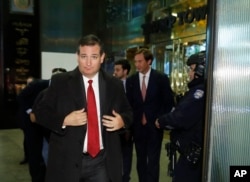The Trump administration is considering whether to designate as a terrorist group the Muslim Brotherhood, a pan-Mideast Islamist movement that traces its origins back to 1928 Egypt and has millions of followers.
The move, some analysts say, carries the risk of roiling already tense relations with some regional allies and could add further to a perception in the Middle East that the new administration is anti-Islam, and views political Islamists and jihadists as one and the same thing.
The Muslim Brotherhood, which was founded in the Egyptian city of Ismailia when Egypt was under British occupation 89 years ago, calls for countries to be governed by Islamic law. The group's affiliates compromised, however, when it came to the introduction of Sharia Law in Tunisia and Libya, following Arab spring uprisings.
The proposal being considered has been paired with a plan to also designate Iran’s Islamic Revolutionary Guards Corps, The New York Times and Reuters reported Wednesday. The newspaper said it based its report on information shared by current and former officials briefed on the matter.
Some key advisers to President Donald Trump have long called for the Muslim Brotherhood to be designated a terrorist organization. Stephen Bannon, the former head of the Breitbart News website and now a chief strategist in the White House, has in the past described the Brotherhood as the “foundation of modern terrorism.”
When asked at a news conference Wednesday about the prospect of designating the Muslim Brotherhood, White House Press Secretary Sean Spicer would neither confirm nor deny the reports.
Author Sebastian Gorka, the director of strategic initiatives at the National Security Council, and Frank Gaffney, the president of the Center for Security Policy, a conservative advocacy group that focuses on jihadist threats to the United States, also have called for the Brotherhood to be added to the terrorist list.
Gaffney’s group has issued warnings frequently alleging the Muslim Brotherhood has been infiltrating the U.S. government.
“The idea of designating the Brotherhood has been kicking around a long time,” according to analysts William McCants and Benjamin Wittes, both of the Brookings Institution, a Washington D.C.-based research group.
They argue there are major legal hurdles in designating the movement as a terrorist organization.
“The Brotherhood as a whole, in several different respects, does not meet the criteria for designation under the statute,” the analysts say in an article posted on the Brookings’ website.
They add, “The Brotherhood is not in a meaningful sense a single organization at all; elements of it can be designated and have been designated, and other elements certainly cannot be. As a whole, it is simply too diffuse and diverse to characterize. And it certainly cannot be said as a whole to engage in terrorism that threatens the United States.”
At his confirmation hearing as secretary of state last month, Rex Tillerson signaled the Trump administration likely would target the Brotherhood, stating that the defeat of the so-called Islamic State terror group “would also allow us to increase our attention on other agents of radical Islam, like al-Qaida, the Muslim Brotherhood, and certain elements within Iran.”
The Muslim Brotherhood, a broad Islamic political and social movement, officially renounced violence in the 1970s in favor of pursuing non-violent reform. Regional offshoots have won power in elections in Egypt after the Arab spring ouster of President Hosni Mubarak in 2011, and in Tunisia.
Turkey’s ruling Justice and Development Party has been influenced by the Brotherhood’s thinking, and maintains informal relations with the movement’s leaders. A Muslim Brotherhood affiliate contested elections in Libya after the ouster of Col. Moammar Gadhafi.
But the movement’s offshoot Hamas, the Palestinian group, has pursued terrorism. And U.S. critics claim the movement’s members are involved in violence in Egypt.
In 2015, Republican Senator Ted Cruz introduced legislation that would have designated the Muslim Brotherhood a terrorist organization. The Obama administration resisted pressure from Republican lawmakers, as well as the governments of the United Arab Emirates and Egypt, to do so. Cruz has re-introduced legislation.
Designating the Muslim Brotherhood a terror organization also would pull against European allies. Two years ago, a British government policy review concluded the movement has a problematic relationship with violence, but it did not recommend designating the Muslim Brotherhood.
Not all Mideast countries would be opposed to the designation, including Egypt’s leader Abdel Fattah el-Sissi, the former general who led the army overthrow of Egypt's first freely elected civilian President Mohamed Morsi of the Muslim Brotherhood in 2013.
U.S. officials claim Saudi Arabia also would have no problem with the designation, arguing that since 2014 the kingdom, which for half-a-century helped fund the movement, has banned the Muslim Brotherhood. But in recent months Saudi officials, who have held discussions with the movement’s leaders, have hinted Riyadh has been considering lifting its own ban on the movement.
Designating the Brotherhood would complicate U.S. relations with Qatar and Turkey, as well as Tunisia, say analysts.






